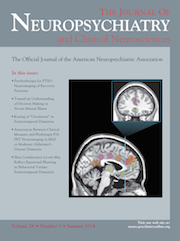Venlafaxine in Treatment Resistant Obsessive-Compulsive Disorder
| Patient 1 | Patient 2 | Patient 3 | Patient 4 | Patient 5 | |
|---|---|---|---|---|---|
| Age | 25 | 30 | 44 | 33 | 34 |
| Gender | Male | Female | Male | Female | Male |
| Age of onset | 15 | 15 | 14 | 26 | 17 |
| Diagnosis | OCD | OCD | OCD | OCD | OCD predominatly obsessions |
| Comorbid conditions | Nil | Dysthymia | Tic disorder, anxious avoidant and anankastic personality disorders | Depression | Depression |
| Principal obsessions | • Contamination | • Aggressive | • Sexual | • Contamination | • Aggression |
| • Religious | • Pathological doubts | • Pathological doubt | • Pathological doubts | • Pathological doubts | |
| Principal compulsions | • Washing | • Washing | • Checking | • Washing | |
| • Repeating | • Repeating | • Checking | |||
| Previous failed trials (adequate dosage and duration) | • Citalopram | • Fluoxetine | • Fluoxetine | Clomipramine | • Fluoxetine |
| • Fluoxetine | • Escitalopram | • Sertraline | • Paroxetine | • Sertraline | |
| • Fluoxamine | • Fluvoxamine | • Escitalopram | |||
| • Paroxetine | • Citalopram | ||||
| • Sertaline | • Fluoxetine | ||||
| Sertraline | |||||
| Failed cognitive behavior Therapy | Yes | Yes | No | No | Yes |
| Augmentation strategies | Risperidone | Risperidone, Memantine | Risperidone | Risperidone, Lithium, Buspirone, Clonazepam | Mirtazepine, Clonazepam, |
| Failed cognitive behavior Therapy | Yes | Yes | No | No | Yes |
| Dose of venlafaxine | 225 mg | 150 mg | 225 mg | 225 mg | 150 mg |
| At the time of initiation of Venlafaxine | |||||
| YBOCS score | 17 | 19 | 23 | 39 | 12 |
| CGI severity | Moderately ill | Moderately ill | Moderately ill | Severely ill | Moderately ill |
| Post venlafaxine trial | |||||
| First follow-up | 6 months | 4 months | 3 months | 6 months | 5 months |
| YBOCS score | 7 | 10 | 13 | 15 | 4 |
| CGI severity | Borderline ill | Mildly ill | Mildly ill | Mildly ill | Mildly ill |
| CGI improvement | Much improved | Much improved | Much improved | Very much improved | Very much improved |
| Last follow-up | |||||
| Time since initiation of Venlafaxine | 75 months | 6 months | 26 months | 45 months | 26 months |
| YBOCS score | 1 | 0 | 0 | 9 | 4 |
| CGI severity | Normal, not ill | Normal, not ill | Normal, not ill | Borderline ill | Borderline ill |
| CGI improvement | Very much improved | Much improved | Very much improved | Very much improved | Very much improved |
References
Information & Authors
Information
Published In
History
Authors
Competing Interests
Metrics & Citations
Metrics
Citations
Export Citations
If you have the appropriate software installed, you can download article citation data to the citation manager of your choice. Simply select your manager software from the list below and click Download.
For more information or tips please see 'Downloading to a citation manager' in the Help menu.
View Options
View options
PDF/EPUB
View PDF/EPUBLogin options
Already a subscriber? Access your subscription through your login credentials or your institution for full access to this article.
Personal login Institutional Login Open Athens loginNot a subscriber?
PsychiatryOnline subscription options offer access to the DSM-5-TR® library, books, journals, CME, and patient resources. This all-in-one virtual library provides psychiatrists and mental health professionals with key resources for diagnosis, treatment, research, and professional development.
Need more help? PsychiatryOnline Customer Service may be reached by emailing [email protected] or by calling 800-368-5777 (in the U.S.) or 703-907-7322 (outside the U.S.).

